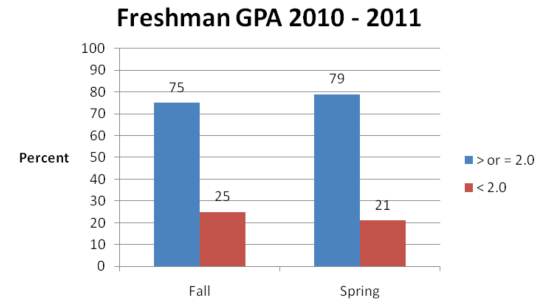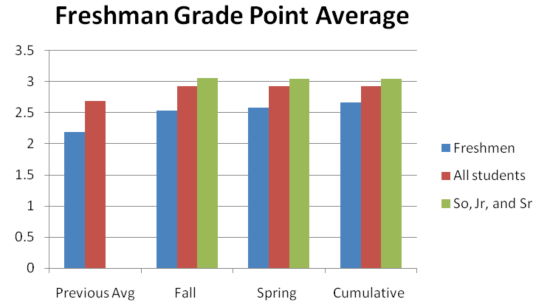
December-
January 2012
Dare to Disciple
----------------------
|

FWBBC introduces a cutting-edge program to help new students succeed in college.
Access to Success
By Greg Ketteman
Free Will Baptist Bible College (FWBBC) has made a long-term commitment to boost educational quality for its first-time-in-college (FTIC) students. It's called QEP or Quality Enhancement Plan, a practical, hands-on program that adds sizzle and practical, measurable results to the hectic world of first-year students.
The entire college family has focused its attention on FTICs and new transfer students with the aim of seeing these students get out of the gate with a solid first-year performance. When students have a successful first year, they are positioned to complete their programs of study on time, with less cost, and with better results.
The FWBBC Quality Enhancement Plan (QEP) focuses on academic results but recognizes that academic success is a product of both personal spiritual maturity and individual development of intellectual ability. The FWBBC QEP—Access to Success—brings the college's community of faith and learning together around the goal of every student being successfully educated to be a leader who will serve Christ, His church, and His world through biblical thought and life. Access to Success helps every FTIC student fully enjoy a successful Bible college experience.
Four Practical Goals
Access to Success has four broad goals for FTIC students:
Improve freshman grade point average (GPA) by .50. In a study of six previous years, FWBBC FTIC students scored an average GPA of 2.19 (4=A, 3=B, 2=C, 1=D). The average GPA for all students during this period was 2.69. As FTIC students achieve an improved GPA average, they will not need to spend their next years struggling to overcome a less-than-desirable first year.
Eighty percent of all freshmen will achieve at least a 2.0 GPA during fall and spring terms. This goal is related to the first goal. The difference is that it seeks to define improvement in the GPA by improvement in the GPAs of many FTIC students rather than a stellar performance by just a few that raises the average. The idea is for every student to improve his first-year GPA.
Freshmen will pass 10% more credit hours. This goal measures FTIC success in another way. It's obvious that if a student improves his GPA this means he has passed more courses. However, some students have marginal GPAs but still pass the required courses. While not every student makes As, we are just as interested in the success of students who may not make A's, but through determination and hard work pass the credit hours they attempt.
Major field and CAAP tests will show 5% improvement beginning in 2014. Every student who enrolls in FWBBC takes a standardized test in his area of study. All students take a comprehensive Bible exam as well as a test to determine beginning knowledge in his field of study. During the senior year, students take the standardized test again (sometimes referred to as an exit exam). The results are then compared to results from their freshman year and analyzed to determine how much students have improved since their first year in college. A 5% improvement is significant on nationally normed exit exams.
This goal is looking ahead to the time that today's freshmen graduate, and we believe that a more successful freshman year will result in a positive difference in the exit exam scores.
Access to Success Initiatives and Purposes
FWBBC faculty, staff, administrators, and students worked together to develop Access to Success. In order to achieve the FTIC student goals of our QEP, several initiatives were put into place.
The Populi System
The college installed a new web-based student information system known as Populi. The Populi Student Information Management System was adopted so that students can have immediate, personal, secure access to their academic, attendance, and financial data. Faculty, staff, and administration can also access student information via Populi.
We believe that by providing students with up-to-date information about their attendance and academic progress, as well as information about each course, professor, assignment, and test, students will always be aware of their standing in these areas.
Revamp Freshman Orientation
The college totally revamped the freshman orientation experience so that FTIC and transfer students will be able to build social relationships in the peer group and be exposed to vital information before other courses begin. The revamped orientation course now occurs before upper-class students return to campus in the fall. Freshmen and transfer students are able to move into dorms, meet with advisors, begin building relationships with peers, and encounter their first college course during this time.
We believe that by building relationships and providing vital information to FTIC students before anything else happens in the term students are able to establish their collegiate footing earlier.
Peer-Mentoring Program
The college began a peer-mentoring program, focused on FTIC students. Peer mentoring offers early, individual social and spiritual support for first-time students to enhance academic motivation and commitment to the college. Peer mentors are selected from upper-class applicants and trained to serve in this important role with their freshman peers.
We believe that signaling to FTIC students that Christian peers are looking out for their best interests encourages new students to more quickly integrate and assimilate into this community of faith and learning.
Freshman Coordinator
The college plans to employ a freshman coordinator (beginning January 2013) to manage and monitor the QEP, including development of freshman profiles, establishment of a formal tutoring program (the college currently has a volunteer tutoring program), and work with peer-mentors.
We believe that having a credentialed, experienced, faculty-level individual who carefully and skillfully leads Access to Success will result in increased numbers of successful FTIC students.
Formal Tutoring
The college will begin a formal tutoring program in August 2013 to systematically address student academic needs by providing trained, managed, one-on-one tutorial assistance. The current volunteer tutoring program is manned by student volunteers, most of whom are teacher education majors. This volunteer program serves its purposes well.
However, we believe that a professionally managed, formal tutoring program will provide an even greater level of academic support for FTIC students.
First Year QEP Results
In the first year, Access to Success has already made an impressive difference for students. The following facts illustrate this (see the charts below for reference):
-
Freshmen earned 88.5% of the credits they attempted.
-
FTIC students registered a cumulative average GPA of 2.58 in the spring, topping the previous five-year freshman GPA average of 2.19 and close to achieving the .50 target increase. (Table 2)
-
Seventy-nine percent of FTIC students finished the year with at least a 2.0 GPA.
-
Freshman class attendance was 88.8% compared to 91% for all students.
-
As a class, freshmen withdrew from fewer courses (only 17 courses for the entire year) and passed 88.8% of the courses in which they enrolled.
-
The freshman fall-to-spring retention target was 67%. The actual freshman fall-to-spring retention rate was 88.6%.
-
Freshmen gave high marks to the revamped orientation experience and the newly implemented peer-mentoring program. Ninety-eight percent of last year's FTIC students passed their first college course (orientation), many with A's or B's.
-
Ninety percent of freshmen gave their mentors credit for supporting and encouraging their spiritual and intellectual growth during their first year in college. Freshmen rated the peer mentoring program as very important in their first-year experience.


What's Ahead for QEP?
Trained FWBBC peer mentors greeted new FTIC students as they came to campus this fall. We continue to provide the Populi Student Information Management System so that all students can access up-to-date information about their courses, attendance, and grades. The revamped Freshman Orientation course opens the college world to FTIC students. We are eager for new students to experience a successful first year of college.
The next steps in the QEP are development of a prototype freshman profile and accepting resumes from individuals who are interested in the freshman coordinator position. (Email gketteman@fwbbc.edu for more information.)
We hope you will pray for the Lord's blessing on FWBBC as we seek to be faithful in the task of educating these Christian leaders to serve Him, His church, and His world.
|
|

